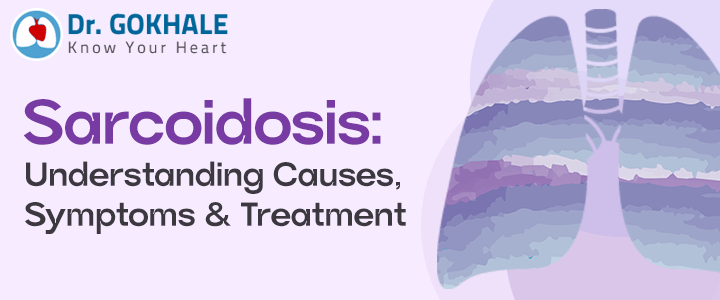Sarcoidosis is a rare inflammatory illness that can affect any area of the body. This condition triggers formation of small clumps of inflammatory cells, called granulomas in organs like the lungs, skin, and lymph nodes. These inflammatory cells can lead to various symptoms, from breathing problems to skin issues and more serious complications.
What Makes Sarcoidosis a Serious Condition?
In the majority of cases (up to 90%), sarcoidosis affects the lungs, causing permanent scarring, which makes it difficult to breathe. Sarcoidosis can also affect the eyes, leading to cataracts, glaucoma, and even permanent loss of vision. When sarcoidosis impacts the nervous system, it may cause facial paralysis, weakness, numbness, or seizures. If it affects the kidneys, it can reduce kidney function and may even cause kidney stones. It can also affect the skin, liver, spleen, and lymph nodes, causing various abnormalities.
Sarcoidosis can also cause inflammation of the heart muscle, leading to heart rhythm problems, heart failure, or even sudden death. In short Sarcoidosis is a serious condition that can cause severe complications even causing death in some cases.
Because it can strike anyone at any time and doesn’t have an exact cause, everyone needs to improve their awareness about this condition to take the right course of action at the earliest.
In this blog, with inputs from leading lung surgeon & Sarcoidosis specialist in Hyderabad, Dr. Alla Gopala Krishna Gokhale, we help you understand the causes, symptoms, and treatment options to help you take the right course of action. Read on:
Causes of Sarcoidosis
The exact causes of sarcoidosis are still under investigation, but several factors are believed to contribute to its development:
- Genetic Factors: A family history of sarcoidosis or other autoimmune diseases can increase the risk.
- Immune System Response: An overactive immune response may lead to the formation of granulomas.
- Environmental Triggers: Exposure to certain dust, chemicals, or infectious agents can potentially trigger sarcoidosis in susceptible individuals.
Symptoms of Sarcoidosis
Each damaged organ has a different set of symptoms associated with sarcoidosis. Some people may have no symptoms, while others may experience severe and disabling symptoms.
Common symptoms include:
- Lymph Glands: Swollen lymph nodes, particularly in the chest, neck, armpits, and groin.
- Eye Symptoms: Blurred vision, eye pain, severe redness, and light sensitivity.
- General Symptoms: Fatigue, fever, weight loss, night sweats.
- Skin Problems: Rash, lesions, discoloration.
- Respiratory Issues: Persistent cough, shortness of breath, and chest pain are prevalent symptoms when sarcoidosis affects the lungs.
Diagnosis of Sarcoidosis
Diagnosing sarcoidosis can be challenging due to its diverse symptoms and similarities with other diseases. A combination of medical history, physical examinations, and diagnostic tests is used, including:
- Chest X-rays and CT Scans: To identify lung involvement and granulomas.
- Pulmonary Function Tests: To assess lung capacity and function.
- Biopsy: Taking a tissue sample from the affected organ to confirm the presence of granulomas.
- Blood Tests: To check for signs of inflammation and organ function.
Sarcoidosis Treatment
While there is no cure for sarcoidosis, various treatments can manage symptoms and improve quality of life. The treatment plan depends on the severity of the disease and the organs affected:
- Medications:
- Corticosteroids: These anti-inflammatory drugs are the primary treatment for reducing granuloma formation.
- Immunosuppressive Agents: Medications like methotrexate and azathioprine can help control the immune response.
- Anti-malarial Drugs: Hydroxychloroquine may be effective for skin and joint symptoms.
- Advanced Treatments:
- Organ Transplant: In severe cases where organ damage is extensive, a transplant may be necessary. For those with significant lung involvement.
Sarcoidosis Treatment in Hyderabad
Are you experiencing symptoms of Sarcoidosis? Don’t wait until your condition worsens. Early diagnosis and treatment are crucial. Dr. Alla Gopala Krishna Gokhale, a renowned Sarcoidosis specialist and lung transplant surgeon at Apollo Hospitals in Jubilee Hills, Hyderabad, offers expert care. Known for his advanced medical facilities and compassionate approach, Dr. Gokhale is dedicated to improving the lives of patients with Sarcoidosis.
 Ask Doctor
Ask Doctor
